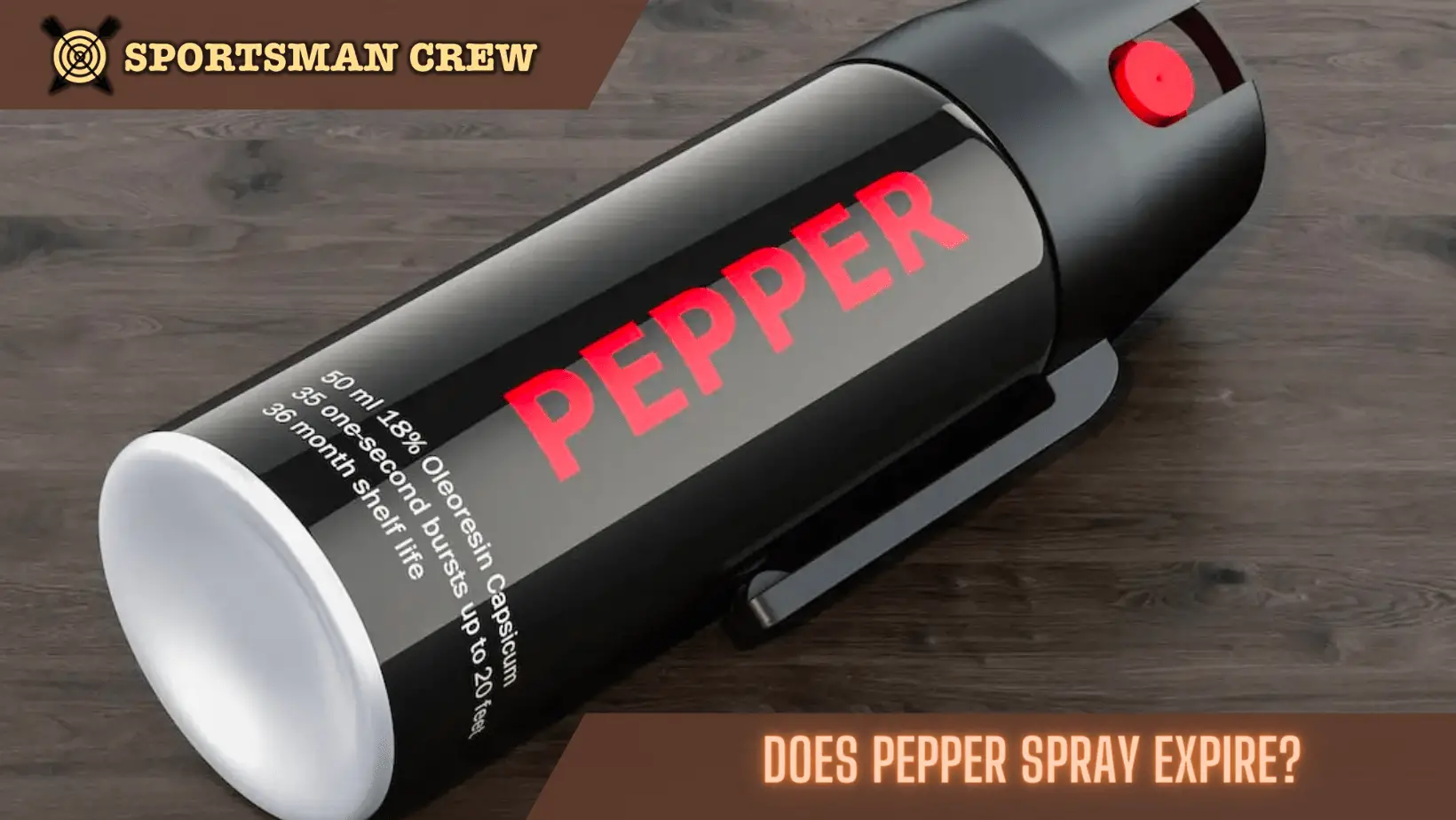Pepper spray is a common self-defense tool valued for its ability to incapacitate an attacker non-lethally. It contains capsaicin, the active chemical component derived from chili peppers, which causes an intense burning sensation when it comes into contact with skin or mucous membranes. Given its critical role in personal safety, it is essential to know whether pepper spray has an expiration date and how it affects the product’s effectiveness over time.
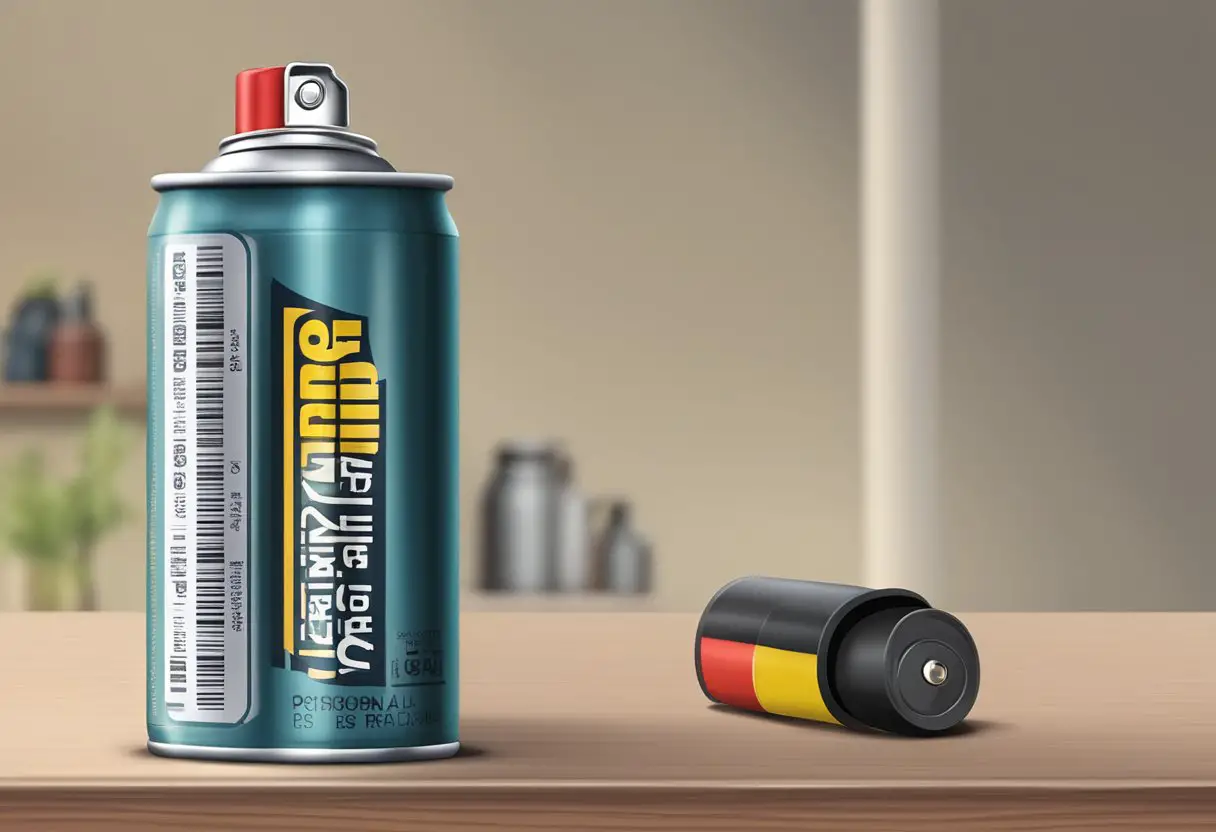
With safety as a priority, maintaining and storing pepper spray correctly is paramount to ensure its reliability when needed. Unlike many other products, the potency and efficacy of pepper spray can degrade over time. This degradation can influence the strength of the spray and its overall functionality, making understanding its shelf life crucial for users. Proper storage away from extreme temperatures and routine checks for expiration dates are significant habits for owners of pepper spray to adopt.
Key Takeaways
- Pepper spray contains chemicals that can lose potency over time.
- Checking expiration dates and storing correctly ensures reliability.
- Regular maintenance and timely replacement are essential for efficacy.
Table of Contents
Understanding Pepper Spray and Its Components
Pepper spray is a potent self-defense tool consisting of specific chemical elements and delivery methods. Knowing its components and mechanisms is crucial for effective and safe use. https://www.youtube.com/embed/1FQLRERU_3Q
Chemical Composition
Pepper spray’s primary ingredient is oleoresin capsicum (OC), which is extracted from the glands of hot chili peppers. This compound contains capsaicin, the active component that provides the spray’s irritating effects. Formulation ingredients typically include water, ethanol, nitrogen, and propylene glycol as carriers or diluents.
Types of Pepper Spray Products
Various formulations exist, such as gel, foam, stream, and cone delivery types. Civilian products often differ from police edition pepper sprays, with variants meant for law enforcement generally having higher OC concentrations.
Delivery Systems and Mechanisms
Pepper sprays use different methods to project their contents. Stream sprays deliver a focused pattern, while cone sprays disperse in a wider area. Gel and foam types are designed to stick to an attacker’s face, reducing cross-contamination. The choice of nozzle and propellant affects the range and effectiveness of the spray pattern.
Brands and Manufacturers
Sabre, Wildfire, Pepper Shot, and Guard Dog are some notable manufacturers. They differ in their product specifications, such as the concentration of OC and the presence of UV-dye for suspect identification.
Legal and Safety Implications
While considered non-lethal, the use of pepper spray carries potential legal consequences. Users must adhere to safety guidelines and be aware of regional laws regulating possession and use.
Pepper Spray as a Self-Defense Tool
An invaluable tool for personal safety, pepper spray can incapacitate an attacker, causing temporary blindness and difficulty in breathing, giving the user time to defend themselves. It’s a highly recommended addition to one’s self-defense repertoire.
The Shelf Life of Pepper Spray
Pepper spray, a defensive chemical compound, has a finite shelf life, with its potency subject to various environmental factors. The duration it remains effective can vary, emphasizing the importance of understanding its expiration timeline and recognizing signs of degradation.
Factors Affecting Potency and Shelf Life
The efficacy of pepper spray is influenced by several environmental conditions. High temperatures and extreme temperatures, either hot or cold, can cause the chemicals in pepper spray to degrade more quickly. Similarly, humidity, light, and moisture exposure are known to impact the stability of the spray. To maintain optimal potency, it is crucial to store pepper spray in cool, dry places away from direct sunlight.
Typical Expiration Time Frame
Most pepper spray products have an expiration date with a typical shelf life ranging from 2 to 4 years from the manufacturing date. Past this time, the compounds may begin aging and chemicals inside could deteriorate, leading to reduced strength and reliability.
Signs of Pepper Spray Expiration
Expired pepper spray often exhibits noticeable changes, making it essential to monitor its condition. Signs to watch for include a change in color or consistency, a nozzle that has become clogged, or any visible damage to the canister. These indicators suggest the pepper spray may have a reduced potency and could be reaching or have passed its expiration.
Storage Guidelines and Maintenance
Proper storage and maintenance are crucial for ensuring that pepper spray remains effective and safe to use. By adhering to specific conditions and conducting regular checks, users can depend on their pepper spray in critical moments.
Optimal Storage Conditions for Pepper Spray
Pepper spray should be stored in an environment that maintains its integrity. It’s best to keep it in a cool and dry place, away from direct sunlight and extreme temperatures. These conditions help to prevent the deterioration of the nozzle and the potency of the spray. High temperatures, for example, could increase the internal pressure, leading to a higher risk of leakage or nozzle failure.
Routine Maintenance and Testing
Conducting regular testing and maintenance is essential for pepper spray. Users should test fire their spray every 90 to 180 days to ensure the nozzle functions correctly and the spray still has the correct range and strength. Prior to testing, it’s good practice to shake the canister to mix the contents, as this helps maintain a consistent performance when deployed.
How to Safely Store Pepper Spray from Children
Safety is paramount when storing pepper spray, especially when children are present. Always store pepper spray out of reach and sight of children, ideally in a locked compartment. By doing so, one ensures that curious hands do not accidentally misuse the canister, potentially causing harm or triggering an accidental discharge.
The key to ensuring that your pepper spray is both effective and safe lies in meticulous storage and ongoing maintenance.
Replacing and Disposing of Expired Pepper Spray
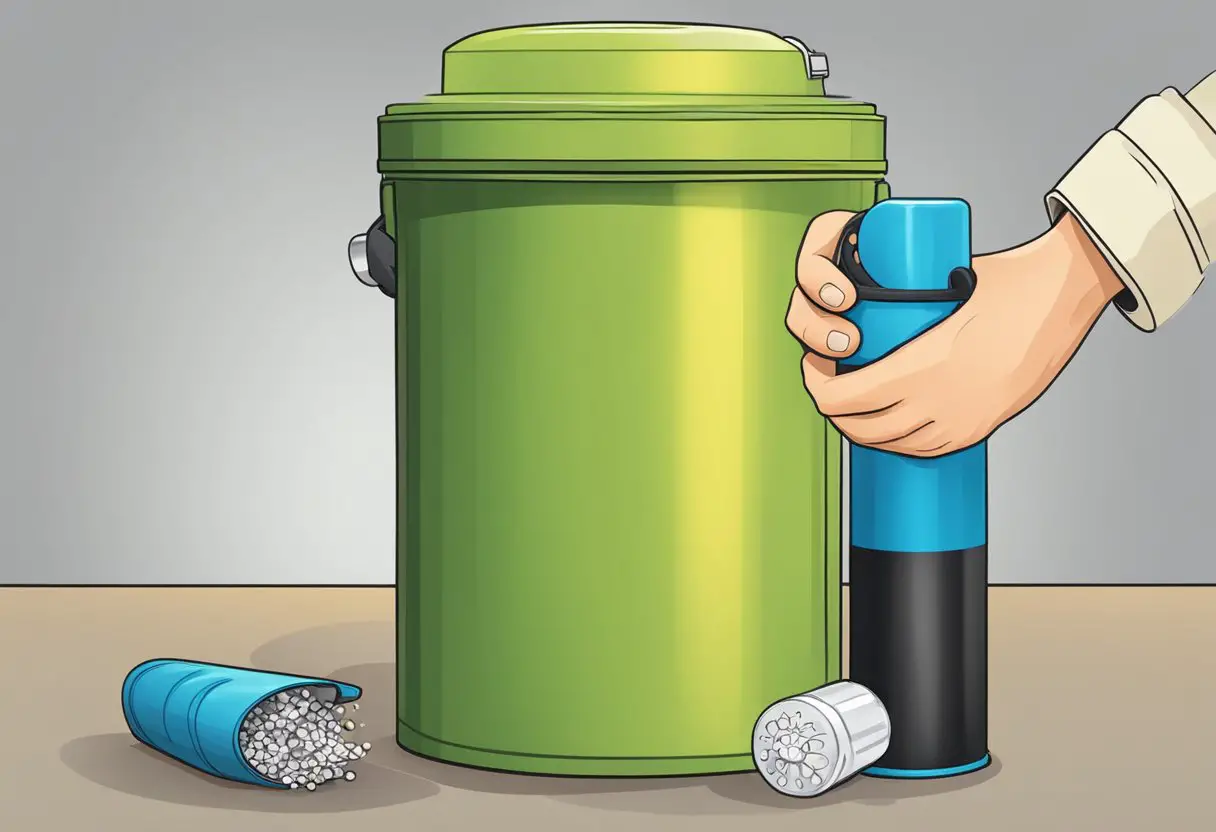
It’s crucial for one’s safety to regularly check the expiration dates on pepper spray canisters, as expired units may not work reliably. Understanding when to replace and how to properly dispose of pepper spray ensures both effectiveness and environmental responsibility.
When and How to Replace Your Pepper Spray
Expiration Dates: Pepper sprays typically remain in working condition for three to four years from their manufacturing date. Users should locate the expiration date on the canister and plan to replace it before this date to ensure effectiveness during an emergency.
- Damaged or Leaking Canisters: Should a canister show signs of damage or leakage, it needs to be replaced immediately, regardless of the expiration date.
- Testing Regularity: Regular testing can reduce reliability; frequent users should replace their spray more often.
Proper Disposal Methods for Pepper Spray
Risks: Improper disposal can lead to safety hazards. Expired or damaged pepper spray should not be simply tossed into regular waste.
- Local Authorities: Individuals can contact their local police or fire department to inquire about safe disposal protocols.
- Recycling Options: Some manufacturers may offer recycling services; it is advisable to inquire about this option when purchasing or looking to replace a spray.
By being diligent with replacement and disposal, users maintain their personal safety and contribute to a safer environment.
Practical Tips for Pepper Spray Owners
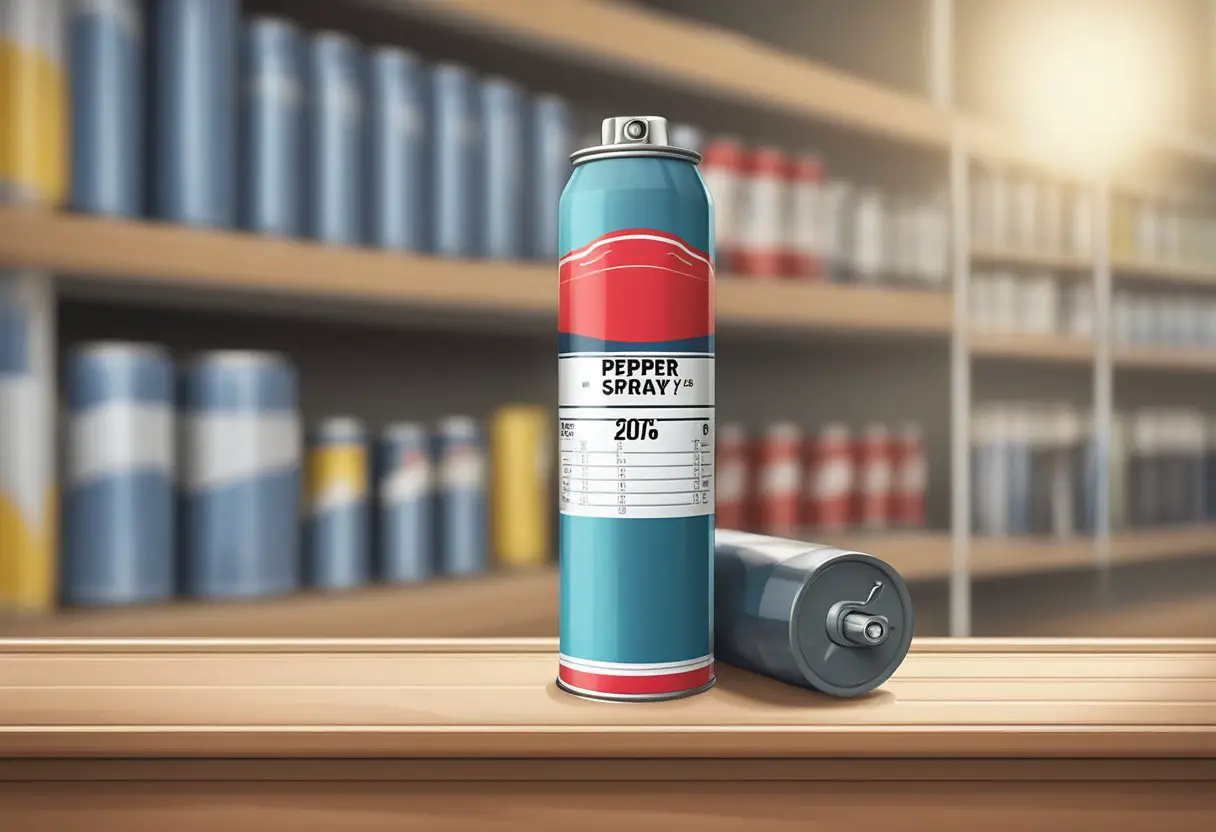
Pepper spray owners should prioritize understanding the tool’s capabilities and limitations for maximum effectiveness and safety. Familiarity with the spray’s potency, the importance of regular maintenance, and the correct decontamination techniques is crucial for those carrying this non-lethal weapon for protection.
Emergency Situations and Accessibility
In an emergency, quick access to pepper spray can make the difference between vulnerability and defense. Owners should carry the spray in a consistent location, such as a side pocket of a purse or a belt holster, to ensure instant accessibility when in a car or on the move. It’s essential to practice drawing the spray from its storage spot to build muscle memory, allowing for swift response regardless of stress or surprise.
Defensive Techniques and Effective Use
Effective use of pepper spray involves accurate targeting to incapacitate an aggressor temporarily. Users should aim for the eyes or face to induce a burning sensation and temporary blindness, providing an opportunity to escape. Training in defensive techniques is recommended to use the spray efficiently against a human or animal while avoiding overly risky maneuvers that may be counterproductive.
Avoiding Common Mistakes
Several common mistakes can compromise the safety and effectiveness of pepper spray. Users should never test the spray indoors, as this can lead to accidental inhalation and harm. It’s also important to check the expiration date regularly; an expired canister might lack pressure or potency, reducing its ability to incapacitate a target.
Decontamination Process After Exposure
If exposed to pepper spray, knowing the decontamination process is critical to reduce pain and recover quickly. The affected individual should blink rapidly to encourage tear production and rinse the eyes with soap and water. Avoiding oil or alcohol-based cleaners can prevent further irritation. Fresh air also helps dissipate the agent and alleviate the burning sensation.
By adhering to these practices, pepper spray owners can enhance their preparedness for emergencies, ensuring the tool serves its purpose as a reliable means of protection.
Frequently Encountered Scenarios and Solutions
While pepper spray is a reliable tool for self-defense and law enforcement, managing its shelf life is crucial to ensuring its effectiveness. Knowing how to maintain the canister and respond to various situations can help prevent potential safety hazards or reduced efficacy. https://www.youtube.com/embed/Sta3XpkvOXc
Pepper Spray in High-Risk Professions
Law enforcement and security personnel often rely on pepper spray as a non-lethal method to neutralize threats. It is paramount that officers test their canisters regularly. They should follow the manufacturer’s guidelines for pressure checks and replace any units upon reaching the expiration date, typically around 3 to 5 years after manufacture, to avoid compromised effectiveness or accidental discharge leading to equipment damage.
Civilian Use and Daily Carry
Civilians carrying pepper spray for personal safety must be aware of the storage and maintenance of the device. A small canister can be less intimidating for daily carry but also requires attention to expiry dates. Civilians should practice mindful storage away from extreme temperatures and periodically test the spray function, ensuring it remains safe and effective for use when necessary.
Dealing with Accidental Discharge
In the event of an accidental discharge, immediate action is crucial. Contaminated areas should be ventilated and affected individuals must flush their eyes with cold water. If a canister shows signs of wear or leakage, it should be replaced promptly. Learning from the Comprehensive Guide to Pepper Spray Shelf Life, users are reminded that a compromised canister’s pressure can lead to unintentional release, and proper disposal guidelines should be followed for safety.
Conclusion
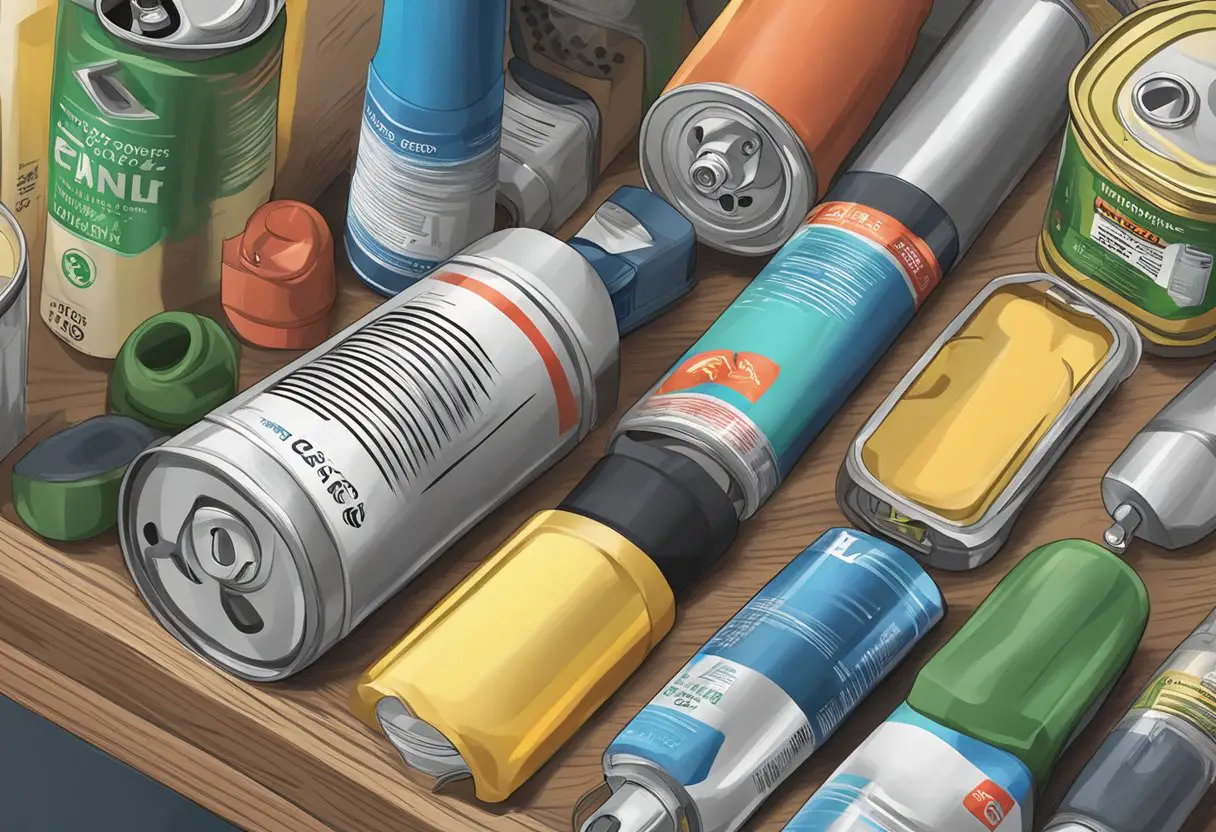
Pepper spray is a widely recognized self-defense tool, valued for its efficacy in deterring potential threats. It is, however, not impervious to the passage of time. On average, pepper spray has a shelf life ranging from 3 to 5 years from the manufacture date, though this can be less if the manufacture date is unknown. It’s paramount for users to regularly check the expiration date on their pepper spray canisters.
Once expired, pepper spray may suffer from a reduction in potency, leading to a decreased effectiveness in a self-defense situation. Exposure to extreme temperatures, sunlight, and oxygen can further accelerate the degradation process. Users should note changes in color or consistency, which signal a need to replace the canister.
- Shelf Life: Typically 3-5 years
- Signs of Expiration:
- Passed expiration date
- Changes in color
- Changes in consistency
Crucially, expired pepper spray may not provide the reliable protection when it is needed most. Therefore, individuals should ensure that they are equipped with a non-expired pepper spray to maintain their personal safety. Proper storage is also key, as optimal conditions can maximize the lifespan of a pepper spray product.
In conclusion, those investing in pepper spray for personal safety should be diligent in maintaining its effectiveness through attentive expiration monitoring and correct storage practices.
Frequently Asked Questions
Throughout the lifetime of a pepper spray, various factors can affect its performance. It’s important to understand the implications of using a spray past its expiration and the storage practices to maintain its efficacy.
Can pepper spray lose its efficacy after the expiration date?
Yes, pepper spray can lose its efficacy after the expiration date, as the propellant may degrade, reducing its spray range and strength.
What are the signs that pepper spray has gone bad?
Signs that pepper spray has gone bad include a weakened stream, inconsistency in spray pattern, or leakage around the nozzle.
How can the potency of pepper spray be affected over time?
The potency of pepper spray can be affected over time by factors such as temperature fluctuations and the breakdown of its active ingredients.
Is it safe to use pepper spray past its expiration date?
Using pepper spray past its expiration date is not recommended, as it may not perform reliably, which is critical in a self-defense situation.
What are the recommended storage practices to ensure the longevity of pepper spray?
To ensure the longevity of pepper spray, it should be stored in a cool, dry place out of direct sunlight and should be checked regularly for any signs of expiration or damage.
Are there differences in expiration between traditional pepper spray and bear spray products?
There are differences in expiration between traditional pepper spray and bear spray products, with bear sprays usually having a longer shelf life due to their specific formulation and intended use.
